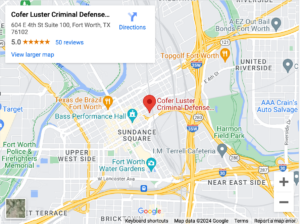
Having a criminal record can follow you long after your case ends. It can make it harder to find work, rent an apartment, or move forward in life. In Texas, expungement gives you a legal way to clear certain arrests and charges from your record entirely. If granted, it’s as though the event never happened.
Expungement is not available in every case, and the process can be complex. Learning about how it works and who qualifies is the first step toward protecting your future. Contact a criminal defense lawyer if you need further assistance.
What Is Expungement?

Expungement (also called “expunction” in Texas) is the legal process that allows you to erase a criminal record in Texas. Unlike record sealing (also called “nondisclosure orders” in the state), which limits access to your record, an expungement destroys the records altogether. That includes police files, booking records, and court documents.
Once your record is expunged, you don’t have to mention the arrest on job applications or rental forms. In most situations, you can legally say the incident never happened.
Who Qualifies for Expungement in Texas?
Texas law allows for expungement in certain situations.
You may be eligible if:
- You were arrested but never charged
- The case was dismissed and did not result in probation
- You were acquitted at trial
- You were pardoned by the governor
- You completed a pretrial diversion program
- The arrest was based on mistaken identity or false information
Some people also qualify for expungement after being convicted of unlawful carrying of a weapon if the offense happened before September 1, 2021. However, not everyone with a dismissed case is eligible. Expungement is not available if you were convicted or placed on community supervision for anything more serious than a Class C misdemeanor.
How Long Do You Have to Wait?
Texas law requires a waiting period before you can file for expungement in most cases.
The length of time depends on the type of offense:
- Class C misdemeanors: 180 days from the date of arrest
- Class B or A misdemeanors: One year
- Felonies: Three years
If charges were brought against you, the statute of limitations must also have expired for every crime for which you were arrested.
How Expungement Works in Texas
If you qualify for expunction, the process begins by filing a petition with the district court in the county where the arrest happened. The petition must list all agencies that might have a copy of your records, including law enforcement and court departments.
After the petition is filed, the court schedules a hearing. The district attorney and the involved agencies have the right to object. If the court grants your petition, it will issue an order directing all parties to destroy their records.
It’s important to make sure every agency is notified. If one is left out, they might retain your information. This is one reason why having legal help is often worth it.
Is a Nondisclosure Order an Option Instead of Expungement?
If you’re not eligible for expungement, you might still have another way to limit public access to your criminal history. In Texas, a nondisclosure order allows you to seal certain records from public view even if you pleaded guilty or no contest.
A nondisclosure doesn’t erase your record, but it does block it from most background checks. That means landlords, employers, and the general public won’t be able to see it. Some government agencies and licensing boards can still access sealed records, but for most people, a nondisclosure can offer major relief.
However, certain crimes (including family violence, murder, and sex offenses) are not eligible for record sealing. Even with lower-level offenses, the rules can be strict and time-sensitive.
How a Criminal Defense Attorney Can Help With the Expungement Process
Expungement laws in Texas are strict, and the process has no room for error. A skilled attorney can review your case, determine if you qualify, and guide you through each step.
An experienced lawyer can help by:
- Reviewing your record to confirm eligibility
- Calculating any required waiting periods
- Preparing and filing your petition
- Identifying all agencies that must be served
- Representing you at the hearing, if one is required
- Following up to ensure records are fully destroyed
Even small mistakes can delay your case or cause your petition to be denied. A lawyer familiar with Texas expungement law can save time and reduce stress.
Contact a Fort Worth Criminal Defense Lawyer for Help With Your Case
Expungement gives you a second chance. If you were arrested but never convicted, or if your case was dismissed, you shouldn’t have to carry that mark forever. Texas law offers a way to wipe the slate clean, but the rules are specific, and the steps must be followed carefully.
If you believe you qualify, contact an experienced Fort Worth criminal defense lawyer at Cofer Luster Criminal Defense Lawyers who understands the expungement process, or call at (682) 777-3336. They can help you navigate the system and work to clear your record.

